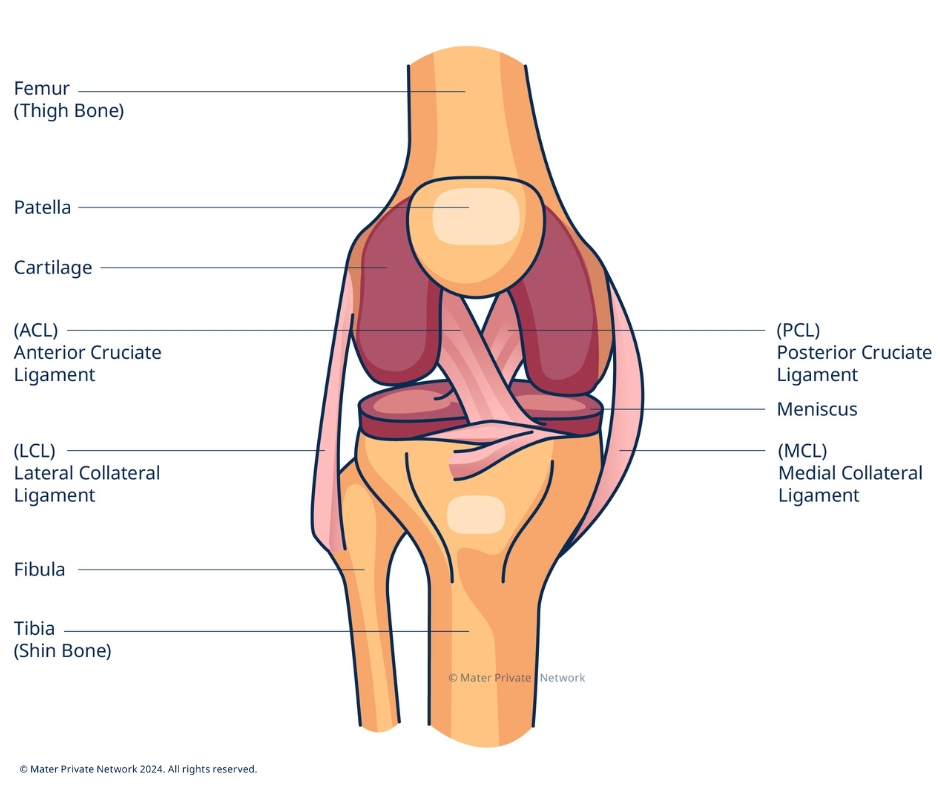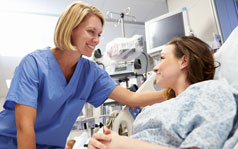Knee Replacement (Total)
Contact Us
Request an AppointmentPlease note that a referral letter is required before an appointment can be confirmed.
Please note that a referral letter is required before an appointment can be confirmed.
Useful Information
About this service
When knee cartilage has worn away, an artificial (or prosthetic) knee joint is used to replace the worn or damaged joint. A knee replacement restores function of the knee, reduces pain and helps many people to return to everyday activities. A total knee replacement surgery is a major surgery, but it is one of the safest and most effective surgical procedures available. It is normally only recommended if other treatments, such as physiotherapy or steroid injections, are unsuccessful at helping to reduce pain or improve mobility.
A surgeon may recommend knee replacement surgery if:
- You experience severe pain, swelling and stiffness in the knee joint and reduced mobility
- You experience knee pain so severe that it interferes with your quality of life and sleep
- Everyday tasks, such as shopping or getting out of the bath, are difficult or impossible to complete
- You cannot work or have a normal social life

Within one month before the operation, you may be invited to attend the pre-operative assessment clinic. During this visit, you will be asked about your medical history and any medications you are taking. Blood tests will be carried out and you may have an electrocardiogram (ECG) and X-ray.
A consultant anaesthetist will discuss the options for anaesthesia, as well as the risks and benefits associated with each. Pain management plays an important part in recovery and rehabilitation and is often of great concern for patients. The consultant anaesthetist and nurse at the clinic will talk to you about pain management after surgery.
The pre-operative assessment clinic gives you the opportunity to see the physiotherapist and nurse, ask any questions you may have and plan for your discharge from hospital.
It is important for anyone planning to have a total knee replacement to understand that an artificial knee is not the equivalent of a natural knee. There must be a realistic expectation about what the operation can achieve. Whilst over 90% of patients have a dramatic reduction in pain, the operation will not allow for a high level of athletic activities, particularly in some high impact sports.
In addition, many patients find kneeling and crouching difficult after a knee replacement due to some residual stiffness in the knee. It is important to remember that the knee heals slowly after a knee replacement and it takes at least three months for the swelling and skin discolouration to settle. The knee will continue to improve for up to one year after the operation as pain lessens and movement recovers.
The majority of joint replacement surgeries are complication free, however, the risks vary depending upon your age and overall health. The surgeon will discuss success rates and complications with you.
Both you and your healthcare team can take several actions before and after surgery to reduce the risks of complications. It is important to be in the best possible overall health and there are a number of things you can do to prepare for surgery, recovery and rehabilitation. It is important to be in the best possible overall health for joint replacement surgery, so that you are ready for the work involved in your recovery to improve your outcome. There are many things that can be done in advance of joint replacement surgery to be ready for your surgery and your recovery:
- Diet: in the weeks before surgery eat a balanced diet as this can help the healing process.
- Smoking: smoking may cause complications with anesthesia and nicotine can delay or interfere with healing. In both cases, this can affect the outcome of the surgery. If you are able to give up or reduce smoking as far in advance as possible before the surgery, this would aid your recovery. Even one week of no smoking would still be helpful.
- Blood clots: to reduce the risk of developing a blood clot in the legs or lungs, a number of recommendations will be given in advance of your surgery.
- Infection: if there are any signs or symptoms of an infection, such as a chest or urinary infection in the days prior to surgery, inform the surgeon. The surgeon will also need to be advised of rash or flare up of psoriasis or eczema around the hip area or a leg ulcer. If you have a history of MRSA/VRE or have been in contact with someone with MRSA/VRE, you should inform your healthcare team.
- Exercise: it is important to be as fit as possible before the procedure, as this will make recovery much faster. You will be given a personal exercise programme to follow in advance of and for a time after the procedure.
Damaged cartilage and bone will be removed and the new metal / plastic implants positioned to restore the alignment and function of the knee. A total knee replacement takes approximately 1 to 2 hours surgery time.
You will be moved to the recovery area until you are stable enough to return to the ward where the team will work closely to aid your recovery.
You will have a drip for intravenous fluids through a vein into the arm or hand which will continue until you are able to eat and drink again. You may eat and drink as required commencing with sips of water followed by a light meal.
The leg will be wrapped in a large bandage and there may be a drain in the knee which is normally removed in the days following surgery.
Your discharge date will be determined by all members of the healthcare team involved in your care, who will work in consultation with your family.
Discharge from hospital normally occurs when you reach specific goals such as the distance you can walk or how much your wound has healed. The surgeon will discuss the expected length of stay prior to admission.
Following discharge, you will continue your recovery at home in your own familiar environment. You will be given a home exercise programme and you can book in for outpatient physiotherapy if required or advised by your surgeon.
Knee replacement physio programme: weeks 0-6 following surgery
Knee replacement physio programme: weeks 7-12 following surgery
Frequently asked questions
Yes, following the knee replacement you will be provided with crutches or a walking stick that will help you walk independently and help you during the recovery process.
Each patient is different in terms of their recovery plan and returning to full mobility. A physiotherapist will work closely with you and will advise you on what to expect.
After a full knee replacement, our physiotherapy team will work on your mobility with you by starting off with bed exercises and progressing to walking with the assistance of crutches/sticks. While some patients might be able to walk with assistance right after the surgery, it might take other patients more time to walk independently with an appropriate walking aid.
What is really important is that you follow the exercise ‘prescription’ that you are given – don’t overdo it and don’t avoid it.







.jpg?sfvrsn=6a6f32bf_1)


